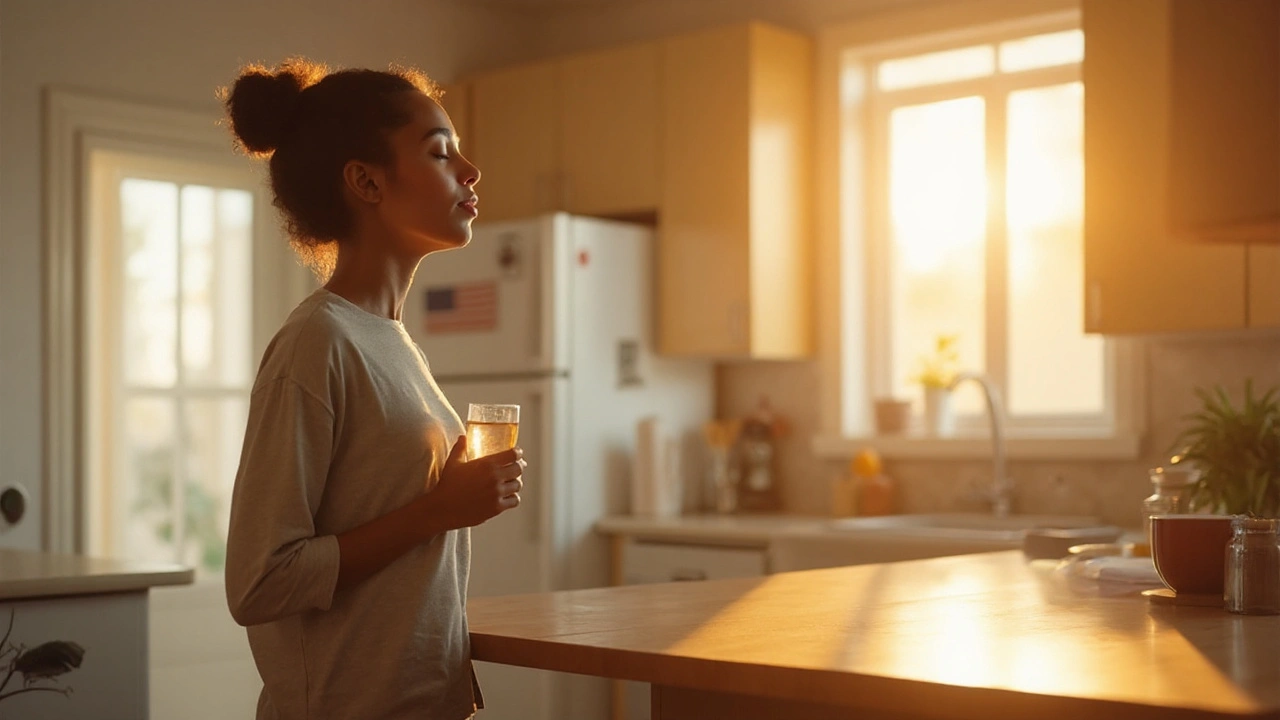Hiccup Prevention Quiz
1. Do you eat slowly and chew your food thoroughly?
2. Do you stay upright for 20‑30 minutes after meals?
3. Do you limit carbonated drinks and alcohol, especially before bedtime?
4. Do you avoid sudden temperature changes in food or drink?
5. Do you keep room‑temperature water handy for quick sips?
Hiccups are involuntary contractions of the diaphragm followed by a sudden closure of the vocal cords, producing the characteristic \"hic\" sound. They usually last a few minutes, but persistent episodes can be uncomfortable and disruptive.
Why Hiccups Happen
Understanding the root cause helps you dodge them. The diaphragm is a dome‑shaped muscle that separates the chest cavity from the abdomen. When it jolts unexpectedly, the vagus nerve (a major component of the parasympathetic nervous system) sends a signal that forces the vocal cords shut, creating the hic sound.
Common triggers include rapid eating, carbonated drinks, sudden temperature changes, and emotional stress. Each of these can irritate the diaphragm or overstimulate the vagus nerve.
Everyday Triggers You Can Spot
- Carbonated beverages (drinkable liquids infused with carbon dioxide) expand in the stomach, pressing on the diaphragm.
- Alcohol (ethanol‑based drinks that relax smooth muscle) can change the tone of the lower esophageal sphincter, leading to reflux.
- Eating too quickly or talking while chewing, which forces extra air down the esophagus.
- Spicy or heavy meals that cause gastroesophageal reflux (upward flow of stomach acids into the esophagus).
Preventive Habits That Work
These habits address the underlying mechanisms rather than just the symptom.
- Mindful eating (slowing down, chewing thoroughly, and pausing between bites) reduces air intake and keeps the stomach from over‑inflating.
- Upright posture after meals (standing or sitting straight for 20‑30 minutes) lets the diaphragm settle and the vagus nerve stay calm.
- Stay hydrated, but sip room‑temperature water (water at about 20°C). Too‑cold drinks can shock the diaphragm.
- Avoid sudden temperature shifts-skip the ice‑cream right after a hot soup.
- Limit intake of carbonated drinks and alcohol, especially before bedtime.
Quick‑Fix Remedies (And How They Help)
If a hiccup sneaks up on you, try one of these evidence‑based tricks.
- Hold your breath (increase carbon dioxide levels in the blood, which can calm the diaphragm). Breathe in, hold for 10‑15 seconds, then exhale slowly.
- Drink a glass of water quickly (creates a swallowing rhythm that resets the hiccup reflex). Use a glass that forces you to take small sips, like a tall tumbler.
- A teaspoon of granulated sugar (provides a mild irritation that can reboot the vagus nerve). Let it dissolve before swallowing.
- Peanut butter spoonful (the sticky texture forces a series of swallows that interrupt the spasm). Hold it in your mouth for a few seconds, then swallow.
- Gently pull on your tongue. The action stimulates the glossopharyngeal nerve, which can help reset the diaphragm.

Comparing the Top Three Home Remedies
| Remedy | Mechanism | Typical Success Rate | Ease of Use |
|---|---|---|---|
| Hold breath | Raises CO₂, calming diaphragm | ≈ 60‑70% | Very easy |
| Drink water quickly | Creates swallowing rhythm | ≈ 55‑65% | Easy |
| One teaspoon sugar | Stimulates vagus nerve via mild irritation | ≈ 45‑55% | Easy, pantry-friendly |
All three work by interrupting the hiccup reflex arc, but holding your breath tends to score the highest because it directly alters blood‑gas levels.
Related Concepts You Might Explore
Hiccups sit at the intersection of several physiological pathways. If you’re curious, dig deeper into these topics:
- Reflex arcs (neural pathways that produce automatic responses).
- Autonomic nervous system (controls involuntary bodily functions, including diaphragm activity).
- Myoclonus (brief, involuntary muscle jerks that can include hiccup‑like episodes).
These areas help explain why occasional hiccups are harmless while chronic hiccups signal something deeper.
When to Seek Professional Help
Most hiccups resolve on their own, but persistent episodes-lasting more than 48hours-warrant a medical check‑up. Possible underlying issues include:
- Severe gastroesophageal reflux disease (GERD) (chronic acid reflux damaging the esophageal lining).
- Central‑nervous‑system disorders such as stroke or multiple sclerosis.
- Metabolic imbalances like high blood‑potassium or low calcium.
A doctor may order imaging, blood tests, or prescribe muscle relaxants if the hiccups are linked to a neurological condition.
Quick Recap - Your Hiccup‑Proof Checklist
- Eat slowly, chew thoroughly, and pause between bites.
- Stay upright for 30minutes after meals.
- Limit carbonated drinks and alcohol.
- Keep room‑temperature water handy for quick sips.
- Know three go‑to remedies: hold breath, drink water fast, swallow a teaspoon of sugar.
- Seek medical advice if hiccups linger beyond two days.
Follow these steps and you’ll keep those spasms at bay, whether you’re in a meeting, on a date, or enjoying a Wellington sunrise.
Frequently Asked Questions
Why do some people hiccup more often than others?
Genetics, diet, and lifestyle all play a part. People with a more sensitive vagus nerve or a habit of eating quickly tend to experience hiccups more frequently. Chronic conditions like reflux or anxiety can also raise the odds.
Can stress really trigger hiccups?
Yes. Stress spikes adrenaline, which can cause the diaphragm to spasm. Practicing deep‑breathing or meditation before meals can lower that risk.
Is it safe to use medication to stop hiccups?
Prescription drugs like baclofen or gabapentin are reserved for chronic hiccups that last weeks or months. For occasional hiccups, home remedies are safer and just as effective.
Do children need special hiccup prevention tips?
Kids should avoid carbonated drinks and be encouraged to eat slowly. A fun tip for them is to sip water through a straw while counting to ten.
Can a diet change eliminate hiccups entirely?
Eliminating trigger foods-especially spicy, greasy, or carbonated items-can dramatically reduce episodes, but occasional hiccups may still happen due to sudden temperature changes or stress.

Pooja Surnar
September 23, 2025 AT 22:45